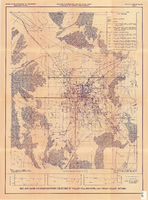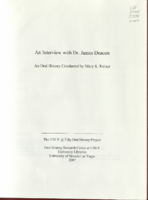Search the Special Collections and Archives Portal
Search Results

Sonny V. Mallari oral history interview: transcript
Date
Archival Collection
Description
Oral history interview with Sonny V. Mallari conducted by Chanele Mallari on November 26, 2021 for Reflections: The Las Vegas Asian American and Pacific Islander Oral History Project. Sonny Mallari talks about his childhood in Masantol, Pampanga province, Philippines with his five siblings. He discusses his family's immigration to Salinas, California and details of his life and parents' lives in the United States. Sonny shares stories of being bullied in school and what the immigration process was like from his point of view at the age of seven. He also talks about his professional work as a cook, moving to Las Vegas, Nevada for work, and becoming a Culinary Workers Union member.
Text

Map and basin profiles showing thickness of valley-fill deposits, Las Vegas Valley, Nevada, 1981
Date
Description
Image
Forever in Our Hearts Documentary
Identifier
Abstract
The collection is comprised of a short documentary film,
Archival Collection
Las Vegas Land & Water Company Records from the Las Vegas Valley Water District
Identifier
Abstract
The Las Vegas Land & Water Company Records from the Las Vegas Valley Water District (1918-1989) are primarily comprised of contracts, correspondence, and maps that document the establishment of a water distribution system in Las Vegas, Nevada that would provide water using the state's Colorado River allocation. The records include water main extension agreements, correspondence, and bills of sale for water main construction, as well as articles and correspondence documenting the groundwater shortage in Las Vegas. The collection also includes maps for water distribution systems and pipelines throughout the Las Vegas Valley.
Archival Collection
UNLV Libraries Collection of Circus Circus Hotel and Casino Promotional Materials and Reports
Identifier
Abstract
The UNLV Libraries Collection of Circus Circus Hotel and Casino Promotional Materials and Reports includes annual reports, financial reports, newspaper and magazine clippings, press kits, press releases, and promotional materials for the Circus Circus hotel and casinos in Las Vegas, Nevada, and Reno, Nevada, dating from 1972 to 2006.
Archival Collection
Las Vegas African American Community Conversations round table interviews
Identifier
Abstract
The Las Vegas African American Community Conversations is a four-part conversation with local Las Vegans. The first part of the round table is moderated by Trisha Geran with a central theme of "Migration, Work and Community Emergence." The panelists discuss the early history of the African American community in Las Vegas, Nevada. They also discuss how and why their families moved to Las Vegas, most citing the economic opportunities as a major factor. The participants share their personal histories and family histories building up the African American community in downtown Las Vegas and the Westside. The second part of the round table is moderated by Sonya Horsford with a central theme of "Education, Economy, and Integration." The panelists discuss the Clark County School District pre- and post-integration. They discuss the hardships of the Sixth Grade Center Integration Plan on the African American community as well as discussing the differences in the school facilities. The round table participants also discuss the social services and social programs and the history of those programs from the African American perspective. They also discuss civic involvement and the various civic groups started by the panelists, and share discrimination they faced.
The third part of the round table is moderated by Claytee D. White with a central theme of "Civil Rights and Entertainment." The panelists discuss the racism and segregation present in Las Vegas and discuss how African American community leaders worked to integrate African Americans into the Las Vegas community. They discuss the 1969 riots in detail, and discuss African American entertainers and the entertainment industry. They share personal experiences working in the entertainment industry and discuss the importance of the local unions, such as the Culinary Workers Union Local 226, the International Alliance of Theatrical Stage Employees Local 720, and their contributions to the unions. The fourth and final part of the round table is moderated by Rachel Anderson with a central theme of the "Early African American Legal Community." The panelists discuss the foundations of the professional legal community in Las Vegas, noting the contributions of Charles Keller, Dr. William Bailey, and the Reverend Marion Bennett as driving forces for civil rights activism in Las Vegas. They share their experiences growing up in Las Vegas facing discrimination and segregation. Lastly, they share the changes they have seen and how both the legal and African African communities have grown.
Archival Collection
Maurine and Fred Wilson Papers
Identifier
Abstract
The Maurine and Fred Wilson Papers (1888-1991) contain family papers and the historical research of Fred Wilson. It includes correspondence between Maurine and Fred Wilson, as well as Maurine Wilson’s diaries, calendars, and materials related to her career as a music teacher. The collection also contains Fred Wilson’s research files about the history of Southern Nevada as well as the First Methodist Church in Las Vegas, Nevada.
Archival Collection

Transcript of interview with Dr. James Deacon by Mary K. Keiser, August 24, 2006
Date
Archival Collection
Description
Text

Transcript of interview with Mary Laub by Wendy Starkweather, December 02, 2013
Date
Archival Collection
Description
Text

Interview with NDE Immersion Group, January 13, 2006
Date
Archival Collection
Description
Text
